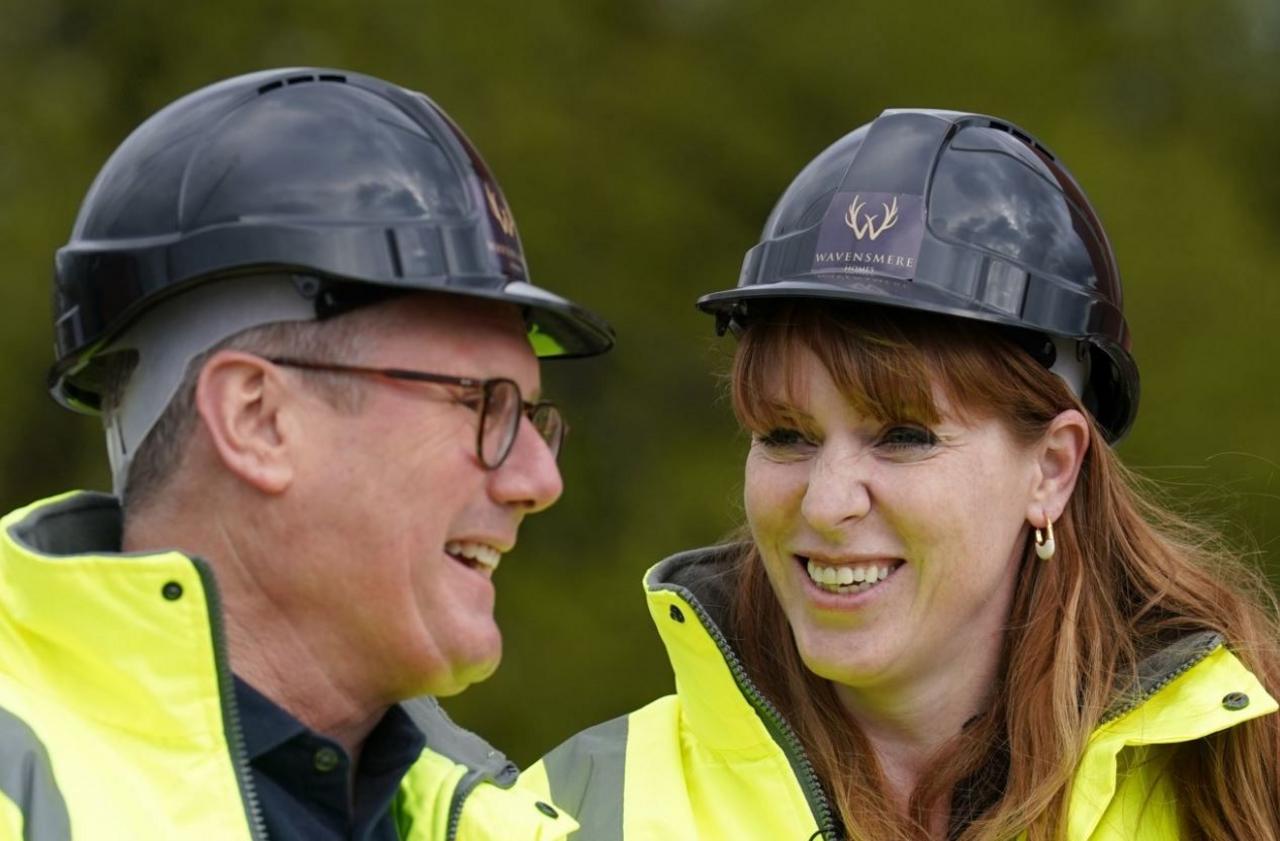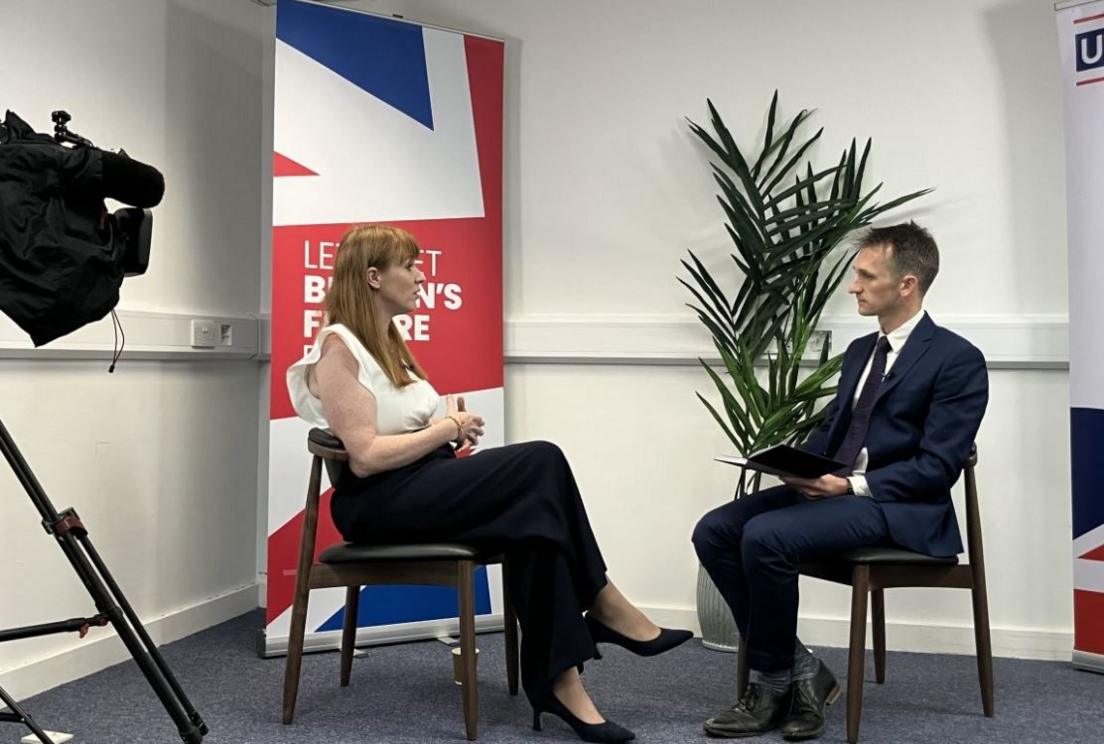Labour to select new town sites by end of first year

Sir Keir Starmer and Angela Rayner say housing is a key priority for Labour
- Published
Angela Rayner has announced that sites for new "towns of the future" will be unveiled by the end of a Labour government's first year in power.
Labour's deputy leader and shadow housing secretary said creating new towns was a key part of her party's plan to build 1.5 million homes over five years.
Ms Rayner hopes the private sector will be persuaded to fund the new towns, which will have to include 40% affordable housing.
But Housing Minister Lee Rowley questioned Labour's funding model and said more "top down" targets would lead to a loss of local support.
Why aren't more homes being built?
What's happened to the government's housebuilding target?
- Published2 August 2024
What's being done to help London's housing crisis?
- Published22 April 2024
Watch: 'Who broke housing system?' Gove asked. Video, 00:01:17
- Published11 February 2024
With planning permission for new homes falling to a record low last year, Ms Rayner has also pledged to reintroduce housing targets in England and reform the planning system.
Labour leader Sir Keir Starmer has previously told the BBC he is a Yimby - "yes in my back yard" - because he wants to "bulldoze" restrictive planning rules and overrule local campaigns, often led by MPs, to build more homes.
But Ms Rayner said Labour's housebuilding schemes would be developed "in lockstep with local people".
She told BBC News: "I think we can do it in a more popular way... I actually think they will be more popular, with more local say, and that local people will be able to get the houses they need.
"A lot of the time, we're seeing these developments that are not given to local people, they're not providing the housing that people need and they're not on the right sites.
"We're seeing development in places where people don't want them."
Ms Rayner said a New Town Commission would be set up within six months, if Labour wins the general election, and a list of sites decided on within a year.
She promised "a new dawn" for "responsible developers" willing to work in partnership with the government and put green spaces, schools, GPs, and transport links at the heart of new communities.
"But those who have wriggled out of their responsibilities for too long will be robustly held to account," she said in a speech.
“Labour’s towns of the future will be built on the foundations of our past.
"The post-war period taught us that when the government plays a strategic role in housebuilding, we can turbo-charge growth to the benefit of working people across Britain."
The post-war Labour government launched the "new town" concept to deal with overcrowding in London and other big cities, with 32 being built, including Milton Keynes, Stevenage and Welwyn Garden City.
But the policy stalled in the 1970s, amid criticism of poor quality housing and transport links.
Labour's Margaret Greenwood, who has spoken out against plans for 240 new homes to be built on greenbelt near Greasby in her Wirral West constituency, is among MPs of all parties concerned about the threat to greenbelt land.
She said: "I'm pleased that Labour is bringing forward these plans to address the housing crisis and that we're going to have well-designed homes and affordable homes but it's important that they're built away from the greenbelt.
"The greenbelt is there to provide a respite from urban sprawl and it's a very important function.
"There's room for over a million homes on brownfield sites so we should be building on those and having that urban regeneration that we desperately need to see."

BBC political correspondent Harry Farley grills Labour deputy leader Angela Rayner on how her housing plan can succeed where others have failed
Ms Rayner confirmed that Labour would reclassify some low-quality areas of greenbelt land, dubbed grey belt, for development, although she would prioritise brownfield sites, which have been previously developed.
When asked whether new towns could be built on greenbelt land, she said: "Yes, in some instances, some greybelt, which is disused - it's not the rolling hills where Margaret is from, or my constituency where we've got the Peak District, or areas like that - but we'd have a brownfield first policy."
Prioritising brownfield, then greybelt, are the first two of Labour's five "golden rules" for housebuilding, with the remaining three being that plans must include affordable housing, infrastructure and public services, and green spaces.
Housing Minister Lee Rowley accused Ms Rayner of being on "fantasy island" in a lengthy social media post on X, external.
He posted: "The challenge with building currently, because of construction costs, is economics.
"Unless Labour are throwing oodles and oodles of subsidy at it, there is almost no chance they hit these rules."
He also claimed Labour's plan would mean more "top down targets".
Mr Rowley has himself intervened to block councils attempting to change local housing plans on at least 10 occasions since taking up the role in mid-November.
Labour prime minister Gordon Brown announced plans for five new "eco towns" in 2007 but these were shelved by David Cameron's coalition government in favour of "garden communities".
Progress has been relatively slow on these though, with the government saying in 2022 they would deliver "up to 16,000 homes per year from 2025", external.
Housebuilding has risen since the last election, with 202,300 new homes started in 2022/23 compared to 187,870 in 2019/20, returning to levels last seen just before the financial crash.
But planning applications have fallen since the middle of 2022, with Labour blaming the planning system and the government's decision to scrap mandatory housing targets in the face of backbench pressure.
Housing charity Shelter said there is "huge potential" for new towns to tackle the UK's housing crisis if the majority of affordable housing is social homes where rents are tied to local incomes.